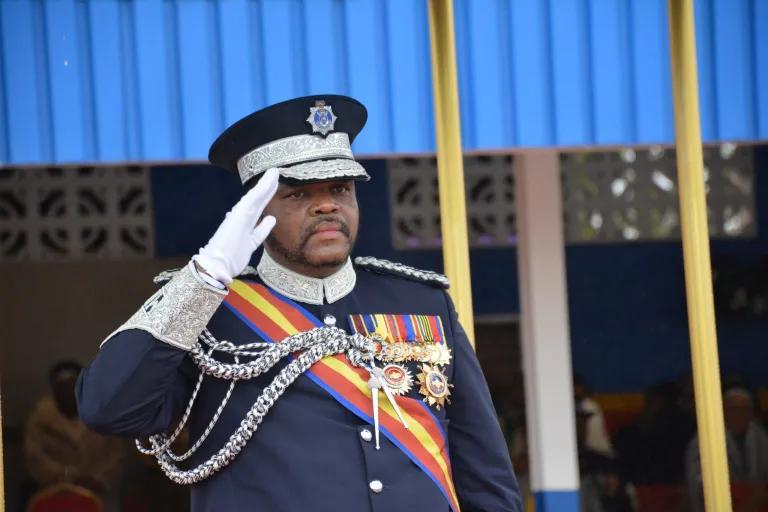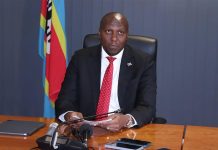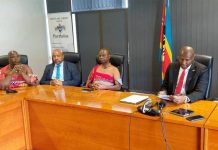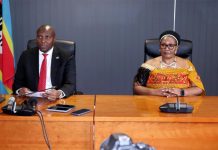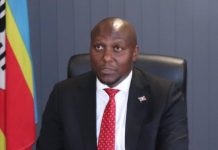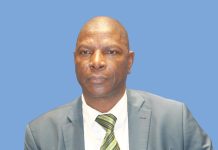Africa-Press – Eswatini. I now understand why His Majesty King Mswati III appointed Russell Dlamini as Prime Minister of the Kingdom of Eswatini.Salute Your Majesty!
Brilliance and political correctness at their best, excellent timing and good posture; calm and collected, the prime minister demonstrated one thing – “we want to talk to you.” They ran away. So far so good PM Russell! He deserves a national handshake. Your Majesty, you have a man. Sometimes, politics is all about sending a message across. As long as that message has been sent, you are home and dry. The prime minister was successful in sending a very crucial message to the local and international community. During the Workers’ Day commemorated at Prince of Wales Sports Ground on Wednesday, all eyes were on thim. I was there.
Diplomats, political analysts, labour experts, philosophers, lawyers, journalists, economists, stock market analysts and professionals from various disciplines wanted to know whether the prime minister would indeed attend the Workers Day Commemorations. In the language of political-point-scoring, there were three expectations from the head of government business in Parliament and chairman of Cabinet – His Excellency the Right Honourable Prime Minister. Firstly, people were eager to know whether he would acknowledge and honour the invite by the Trade Union Congress of Swaziland (TUCOSWA).
Eye-catching
Great work Mduduzi Gina, the Secretary General of TUCOSWA and Bheki Mamba, the President of TUCOSWA! “PM rejects TUCOSWA invite,” that would have been an eye-catching headline if the prime minister did not attend. Either way there was going to be a story here. If the prime minister did not attend, the criticism wouldn’t have carried much weight because the defunct Swaziland Federation of Trade Unions (SFTU), during its time, sometimes issued invitations to government, which government did not honour. Mind you, the prime minister would have also sent a representatives or simply put, he would have a sent either a minister or a principal secretary to represent him.
Therefore, acknowledgement of the invite was critical for the prime minister, hence, all eyes were on him. About two decades ago, I asked the then Prime Minister Sibusiso Dlamini whether he received a letter of complaint from Amnesty International. In fact, I wanted to know when he would respond to the letter in which the organisation complained about the country’s human rights record. Unhappy about the organisation’s line of questioning and the tone of the written message, Dlamini responded: “Ngiyifake ku dustbin Nkambule), meaning I did receive the letter, but I put it in the trash.”
Our government has all along been receiving some invites and rejecting some and accepting others. To be honest, I thought the prime minister would reject the invitation or rather send a representative. Secondly, emaSwati waited for the prime minister’s appearance at the Prince of Wales with baited breath. Finally, he arrived, and that was unprecedented. That he came, it’s enough. Remember, he arrived at the Prince of Wales having already met or scored two vital political goals – acknowledging the invite and honouring it.
The third expectation was his speech. People wanted to know what he would have said. You disrupt him or not, he had a written speech, which the media would have published anyway. By attending the event, he basically demonstrated to the outside world, mainly the diplomatic community that His Majesty’s Government has restructured itself to accommodate and observe the open-door policy, sending a message that the State has always been willing to engage the workers.
Immaterial
That Dlamini was unable to deliver his speech at the venue is immaterial as he was able to do so through traditional media and social media.
It was his presence that mattered. In fact, we had expected him not only to address the workers who attended the event, but the workers at home and nation at large, something which he did through the power of the media. On another note and on a very serious note, I have always said that the advocacy for multiparty democracy is in the wrong hands. I was vindicated on Wednesday.
I still maintain that the current generation advocating for multiparty democracy, which exists worldwide, will not achieve their goal unless they restructure all their organs. I foresee Eswatini allowing multiparty democracy to coexist with Tinkhundla System of Government in the next two generations. I also foresee emaSwati who support partisan politics calling for liberation from those who are presently advocating for political reforms. This is because they are messing up and misrepresenting them whenever the opportunity to sell their manifestos avail itself.
A preacher cannot expect to convert the people he oftentimes insults whenever he gets a chance to preach from the pulpit. I believe that the generations, perhaps, will make sense as they about the significance of multiparty democracy. They will advocate for this political system in the context of national identity. The current generation is not talking to emaSwati. Every nation, whether you studied at Harvard University for a year or four, has a special way, founded in its tradition, to receive or transmit a message. I am obligated, legally and morally, to ensure that I pay school fees for my children.
“You fool, my teacher sent me to remind you to pay school fees,” what happens when my son utters these words? This is exactly what the political activists are doing. Family build communities and communities set up government. I hope you understand what I mean. Julius Malema is two-faced when one gives himself or herself adequate time and space to analyse his character. Malema knows when to hit hard or become soft in order to transmit an important message. Some people haven’t seen him in Parliament praising Cryil Ramaphosa or addressing some ministers.
They assume that Julius is always shouting at the president and government ministers or ANC leaders. In Eswatini, we have some political activists who have adopted Julius’s philosophical line of questioning or critiquing. Julius lives and operates in a different environment. On Wednesday, I exchanged pleasantries with Wandile Dludlu, the Deputy President of the People’s United Democratic Movement (PUDEMO). That was before he delivered his speech. I had not anticipated that Wandile would relegate himself to the level of junior political activists. I understand that he is a law student. A law student knows what to say, when and how.
Allegations
He cannot make serious allegations against another person without substantial evidence. A political rally or Workers Day commemoration does not give speakers the right to accuse other people of committing crimes unless the accuser has a leg on which to stand. What happens to the accuser when the person he accuses of theft and corruption takes him to a civil court? You are never taken to a civil court to laugh. During the Workers Day Commemoration, I heard the guy who wore a cap accusing another person of committing “rape.” Where did you report this case? Where is the rape survivor?
Again, what happens to the accuser when he is taken to court to prove that the person he accuses indeed committed rape? I know what he will say. He will complain about human rights violations, triggering some organisations to picket and demand justice for the person hurling insults at other people.
The person who has been person accused of rape in the name of pseudo freedom of expression has a right to dignity, which the political activist in question is expected in law to observe. You can’t exercise your preferred right to infringe on others.
I was impressed with Mphandlana Shongwe. In speech, he conducted himself very well. Aging like fine wine, Shongwe continues to outsmart the fumbling young political activists. Mphandlana, a staunch supporter of multiparty democracy, respects and addresses those who support the Tinkhundla System of Government in a dignified manner. He knows when to hit hard on them. Shongwe does not support Tinkhundla System of Government but respect his fellow countrymen who support the current status quo. Sometime ago, I attended a function at Franson Christian High School for ex-pupils, which was attended by Sibusiso Barnabas Dlamini and Mphandlana Peter Shongwe.
Despite their political differences, I was happy to see Mphandlana and Barnabas shaking hands and enjoying light moments. Mphandlana did the same during the Smart Partnership National Dialogue when he honoured a handshake with Barnabas. Mphandlana can make a very good soul winner. At the Prince of Wales, he represented an organisation called the Friends of Palestines. Respectfully, politely and calmly, he asked the prime minister to stand up alongside other attendees to observe a moment of silence in honour of the Palestinians who lost their lives during the Israel-HAMAS conflict.
Without any objection, the prime minister, a staunch Christian observed the moment of silence. In politics, we say the prime minister was politically correct.
I was there to observe the proceedings in first person. It was a group of less than 100 politicised workers, with a majority being political activists, who disrupted the proceedings. I stood a few metres from them before I also left for cover. At that time, other workers were complaining about the behaviour of the disruptors. They did not understand why the disruptors denied them the right to hear the prime minister responds to their grievances and requests for the recognition of the severance allowance.
Disrupting
The disrupting brigade also denied themselves the right to file the prime minister’s speech for future reference. Wandile had made serious allegations against the prime minister, to which, he would have, perhaps, responded. This now begs the question on whether political activists are ready to match in political conversation or dialogue with the stalwarts of the Tinkhundla System of Government. In any dialogue setting, there are talks about talks. In fact, successful countries usually “dialogue about the dialogue.”
In Eswatini, they want a dialogue, but can’t allow the prime minister to deliver a speech in reaction to the workers’ requests or grievances.
In the language of the ILO, government is a social partner. It is a key stakeholder. “We don’t want to be addressed by the government that killed people in 2021,” one political activist I have known for more than a decade said as he chanted a political slogan aimed at disrupting Phila Buthelezi, the Minister of Labour and Social Security who should also be applauded for convincing the prime minister to attend the function.
If the political parties that formed part of the Workers’ Day’s agenda do not want to be addressed by the government, they must then dialogue among themselves. At the end of the day, the current generation advocating for multiparty democracy has lost it, and it needs to go back to the drawing board.
Source: TIMES
For More News And Analysis About Eswatini Follow Africa-Press


